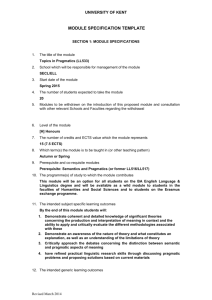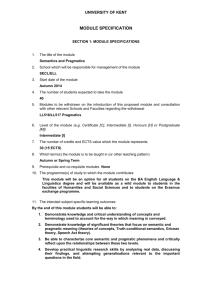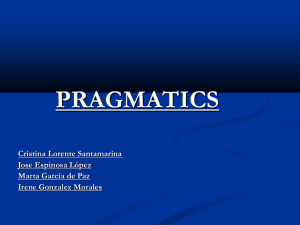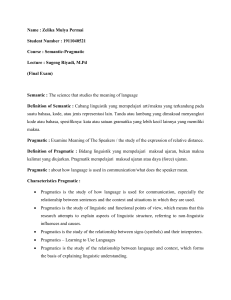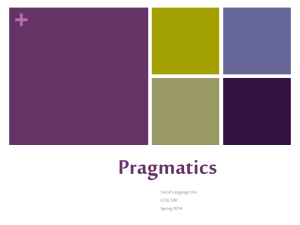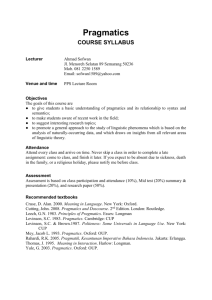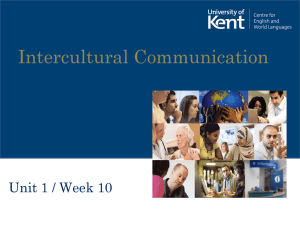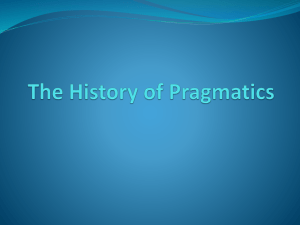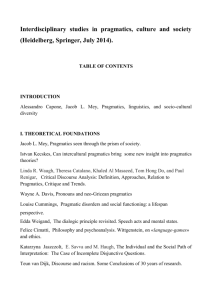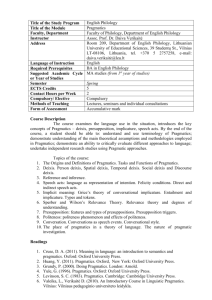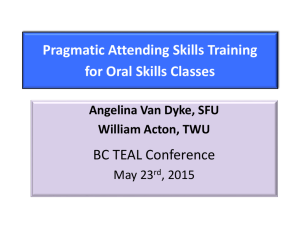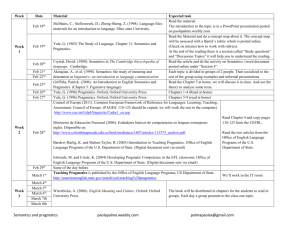SECL - University of Kent
advertisement
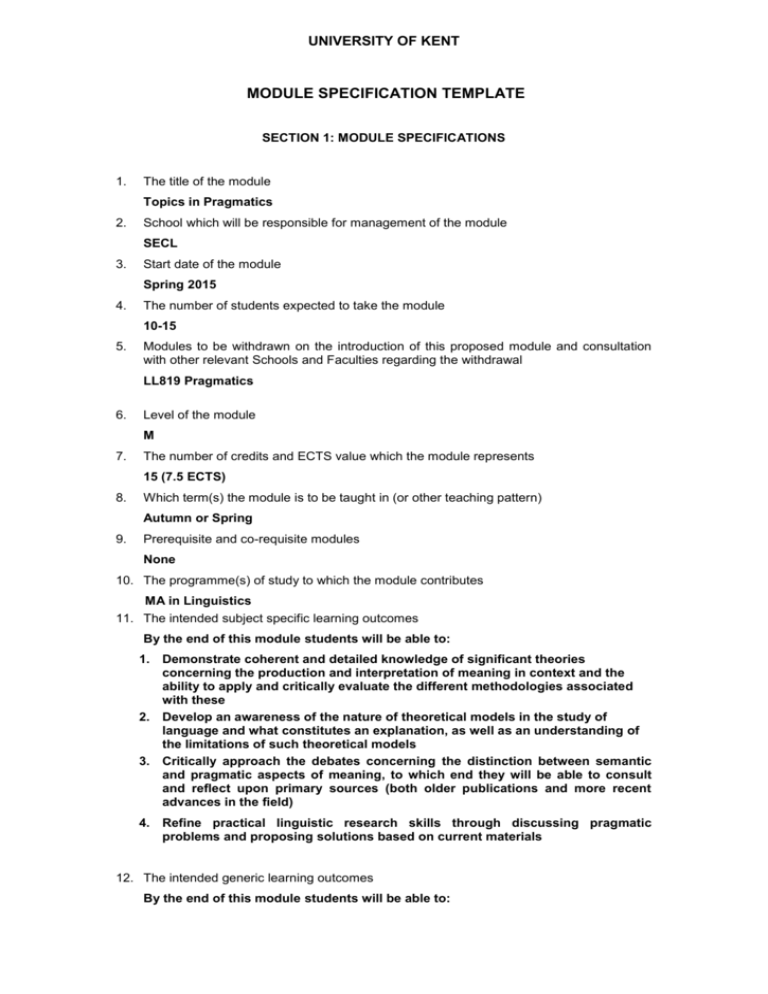
UNIVERSITY OF KENT MODULE SPECIFICATION TEMPLATE SECTION 1: MODULE SPECIFICATIONS 1. The title of the module Topics in Pragmatics 2. School which will be responsible for management of the module SECL 3. Start date of the module Spring 2015 4. The number of students expected to take the module 10-15 5. Modules to be withdrawn on the introduction of this proposed module and consultation with other relevant Schools and Faculties regarding the withdrawal LL819 Pragmatics 6. Level of the module M 7. The number of credits and ECTS value which the module represents 15 (7.5 ECTS) 8. Which term(s) the module is to be taught in (or other teaching pattern) Autumn or Spring 9. Prerequisite and co-requisite modules None 10. The programme(s) of study to which the module contributes MA in Linguistics 11. The intended subject specific learning outcomes By the end of this module students will be able to: 1. Demonstrate coherent and detailed knowledge of significant theories concerning the production and interpretation of meaning in context and the ability to apply and critically evaluate the different methodologies associated with these 2. Develop an awareness of the nature of theoretical models in the study of language and what constitutes an explanation, as well as an understanding of the limitations of such theoretical models 3. Critically approach the debates concerning the distinction between semantic and pragmatic aspects of meaning, to which end they will be able to consult and reflect upon primary sources (both older publications and more recent advances in the field) 4. Refine practical linguistic research skills through discussing pragmatic problems and proposing solutions based on current materials 12. The intended generic learning outcomes By the end of this module students will be able to: UNIVERSITY OF KENT 1. Demonstrate their ability to undertake independent learning, by taking initiative, being organised and meeting deadlines 2. Further develop their skills in critical reflection and analytical discussion of their own writing and the writing of others 3. Communicate information and ideas in a discipline-specific manner 4. Develop their presentation skills, specifically the ability to clearly communicate their ideas to the class with the help of technology 13. A synopsis of the curriculum This module will focus on extending students’ critical understanding of pragmatic meaning. Central areas of linguistic pragmatics, such as conversational implicature, maxims of conversation, and principles of politeness and speech acts are outlined, discussed and evaluated critically. The module also explores controversies over the universality of the aforementioned theories, looking more closely at how human interaction is based on different cultural scripts and encouraging students to reflect upon and discuss the cultural influences which influence meaning in a range of intercultural communicative settings. In addition, the module examines topics where theories have traditionally straddled the boundary between semantic (context-independent) and pragmatic (contextdependent) meaning, such as presupposition, quantification and reference. Finally, students will have the opportunity to evaluate the efficacy of pragmatic theories on the basis of empirical investigations, familiarising themselves with relevant methodologies and tools of analysis. 14. Indicative Reading List Archer, D. & Grundy, P. (2011). The Pragmatics Reader. Routledge. Birner, B. (2012). Introduction to Pragmatics. Wiley-Blackwell. Burton-Roberts, N. (2007). Pragmatics. Palgrave Macmillan. Huang, Y. (2006). Pragmatics. New York: Oxford University Press. Horn, L. R. & G. Ward (eds.) (2004). The Handbook of Pragmatics. Oxford: Blackwell. Jaszczolt, K. (2002). Semantics and Pragmatics: Meaning in Language and Discourse. London: Longman. Kadmon, N. (2001). Formal Pragmatics: Semantics, Pragmatics, Presupposition, and Focus. Oxford: Wiley-Blackwell. Noveck, I. & Sperber, D. (2004) Experimental Pragmatics. San Diego: Palgrave. Sperber, D. & Wilson, D. (1995) (2nd ed.) Relevance: Communication and Cognition. Oxford: Blackwell. 15. Learning and Teaching Methods, including the nature and number of contact hours and the total study hours which will be expected of students, and how these relate to achievement of the intended learning outcomes This module will be taught in two weekly seminar hours for ten weeks, 20 contact hours in total. The module will not meet during reading weeks (weeks 5 and 9 of the term). UNIVERSITY OF KENT The seminars will address key pragmatic theories (subject specific learning outcomes 11.1-2 and provide for in-depth practice and discussion of the topics covered in the lectures (subject specific learning outcome 11.3-4; generic learning outcomes 12.1-4). Total number of study hours for the module (including all contact time, private study and work on assignments): 150 16. Assessment methods and how these relate to testing achievement of the intended learning outcomes 100% coursework, consisting of one seminar presentation and 2 take-home assignments. Seminar Presentation: 20% 1 x 1500 word assignment: 35% 1 x 2000 word assignment: 45% The seminar presentation will assess the students’ ability to work in groups and present in a clear and succinct manner the main points of one of the debates in pragmatic theory and research and will test learning outcomes 11.2-3 and 12.2-4. The take-home assignments will assess the students’ understanding of pragmatic theories and their ability to critically analyse linguistic data, while encouraging them to do independent research and consult primary sources, and will test learning outcomes 11.1-4 and 12.1-3. 17. Implications for learning resources, including staff, library, IT and space No major implications; small group sizes are important, ideally no more than 15 students each. 18. The School recognises and has embedded the expectations of current disability equality legislation, and supports students with a declared disability or special educational need in its teaching. Within this module we will make reasonable adjustments wherever necessary, including additional or substitute materials, teaching modes or assessment methods for students who have declared and discussed their learning support needs. Arrangements for students with declared disabilities will be made on an individual basis, in consultation with the University’s disability/dyslexia support service, and specialist support will be provided where needed. 19. Campus(es) where module will be delivered: Canterbury
